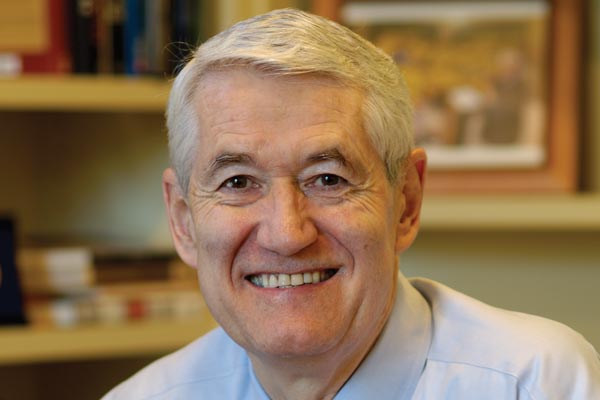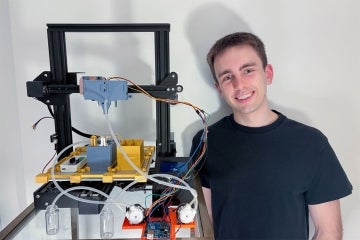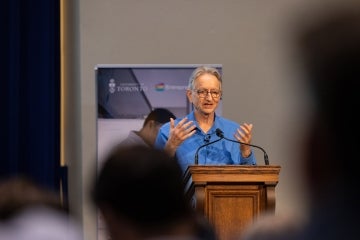
Honorary graduate Robert J. Birgeneau
Published: June 13, 2013
A former president (2000-2004) of the University of Toronto and chancellor of the University of California, Berkeley, Robert J. Birgeneau is also one of the most cited physicists in the world.
The St. Michael's College alumnus received his Bachelor of Science degree from U of T before going on to become a globally renowned expert in the field of fundamental properties of materials, and a prominent leader in higher education.
In recognition of his extraordinary accomplishments, Birgeneau receives a Doctor of Science, honoris causa from U of T June 13, at the Convocation ceremony for St. Michael's students. (Watch the ceremony online.)
Writer Gavin Au-Yeung asked Birgeneau to share some thoughts about higher education, the University of Toronto and his time at St. Michael’s College.
What has been your greatest key to success?
Hard work and a willingness to take on directly difficult issues.
At Berkeley, over a very short period of time, the California state government removed more than half of our funding. This required us to change completely the financial model of the university. To stay true to our ideals, we needed to do this in a way which would enable us to continue providing comprehensive access to students from low-income backgrounds, but, at the same time, maintain our world-class excellence in research. This proved to be remarkably challenging, but in the end we were successful.
And your proudest achievement?
I would say that I am most proud of my leadership at both the University of Toronto and at the University of California, Berkeley. I have had the good fortune of being able to serve as head of both Canada’s and the United States’ top public universities.
What advice can you share with graduating students?
(1) Figure out what you really like to do, and (2) figure out what you are really good at. Work hard to ensure that those two are as close as possible, and use that as a guide to your future career.
I also advise students not to lock themselves into one definite career very early on. They should explore as many options as possible first and then choose the one which they find most satisfying.
What is the true value of a post-secondary degree?
Well, first, the economic impact in terms of one’s lifetime income is enormous. At the same time, education teaches you about human values, making you a better member of society. I would also like to remind students of the importance of their spiritual lives; this is one aspect of human life which one learns to treasure at St. Michael’s College.
Can you share some memories of your time at U of T and at St. Michael’s College?
First of all, that’s where I met my wife, so that has proved to be profoundly important – we’ve been married for 49 years. Rick Alway, the past president of St. Michael’s College was leading the orientation for the new students, and that is where I met my wife Mary Catherine. We have had rich and fulfilling lives together.
One feature of the University of Toronto which is especially good is the college system. On the one hand, you have this great university with more than 60,000 undergraduates; at the same time, you can go to a college like St. Michael’s and have the intimacy of a small university. Thus, one has the benefits of being in a small college and simultaneously, the resources of a great public research and teaching university. In that sense, U of T is unique in North America.
I believe that it would profit U of T to invest more energy and resources enhancing its international profile. The University of Toronto is deservedly renowned within Canada, but I do not think that its excellence is fully appreciated internationally.
What went through your mind when you heard about the honorary degree?
As a former president of the university, I was very pleased to hear about it – David Naylor had called me directly to inform me.
Biography
An internationally distinguished physicist, Robert J. Birgeneau is a respected leader in higher education known for his commitment to diversity and equity in the academic community. An alumnus of the University of Toronto, Birgeneau served four years as president as its 14th President, 2000-2004, before stepping down to become the chancellor of the University of California, Berkeley, in 2004. He remained in this capacity for nearly nine years, 2004-2013, successfully advancing a vision of “Access and Excellence”.
A Toronto native, Birgeneau received his BSc in mathematics from the University of Toronto in 1963 and his PhD in physics from Yale University in 1966. He served on the faculty of Yale for one year, spent one year at Oxford University, and was a member of the technical staff at Bell Laboratories from 1968 to 1975. He then joined the Massachusetts Institute of Technology where he spent 25 years on the faculty. He was named chair of the Physics Department in 1988 and dean of Science in 1991.
Among other scholarly societies, Birgeneau is a fellow of the U.S. National Academy of Sciences, the Royal Society of Canada, the Royal Society of London, the American Philosophical Society, and the American Academy of Arts and Sciences. He has received many awards for teaching and for his research on the fundamental properties of materials and holds several honorary degrees.
Robert J. Birgeneau stepped down as chancellor at the end of May, 2013 but remains on the UC Berkeley campus as a member of its faculty in the Departments of Physics and Materials Science and Engineering. Birgeneau is also the leader of the Lincoln Project, an initiative of the American Academy of Arts and Sciences both to advocate for the importance of public colleges and universities and to devise strategies to reverse the progressive disinvestment in public higher education by government.



